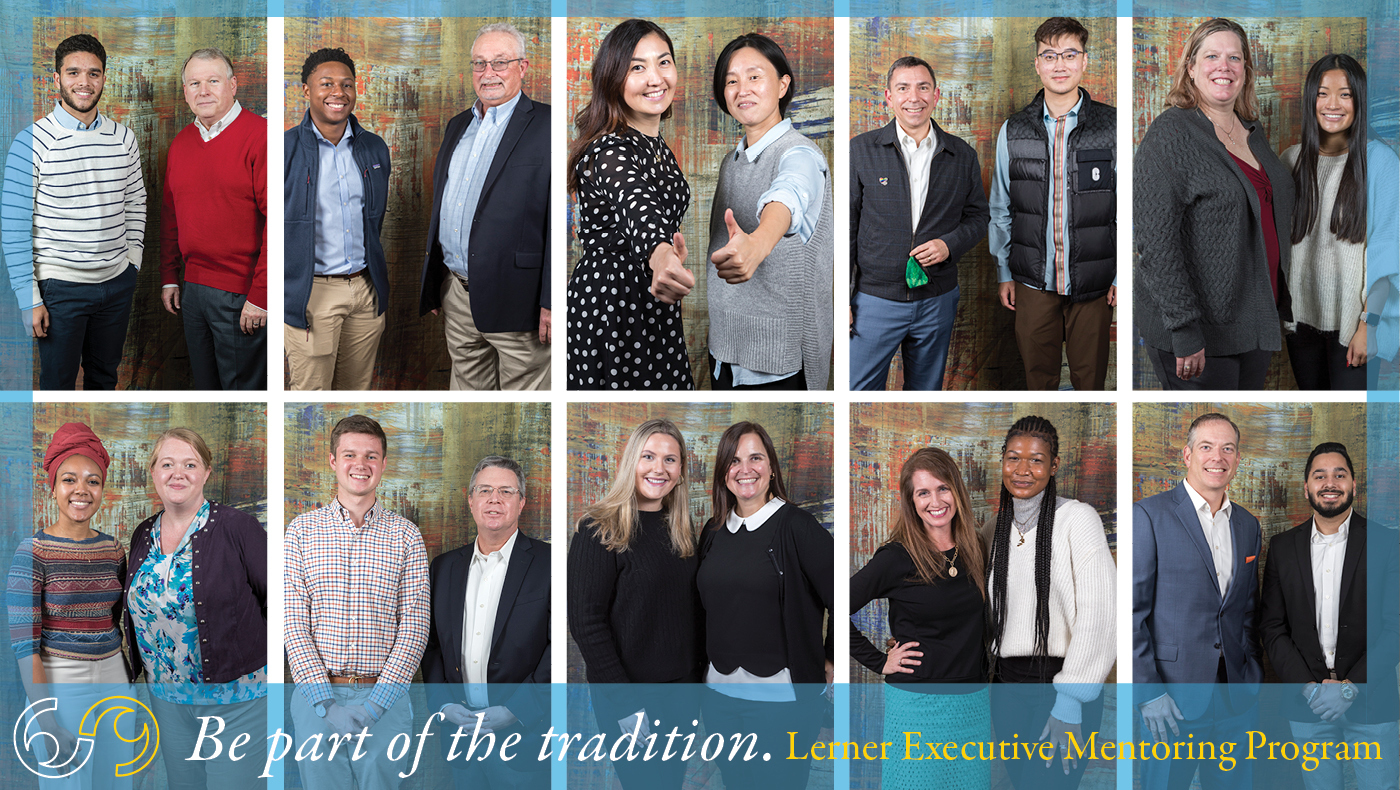In the modern workplace, young professionals are encouraged to build connections, expand their networks and pursue mentorship opportunities in order to advance their careers. At the same time, there are many experienced industry professionals who are eager to share the skills and knowledge they have gained throughout their careers. The issue both groups face is how to get started and begin to build a mentoring relationship.
The University of Delaware helps to bridge these groups to create and foster successful mentoring relationships through several programs across the university. One such program is the Lerner Executive Mentoring Program at UD’s Alfred Lerner College of Business and Economics.
This program creates one-on-one matches between professionals who have 10 or more years of progressive career experience and current undergraduate and graduate students at the Lerner College. Several participants in the Lerner Executive Mentoring Program spoke with the Lerner College to share their advice for those interested in building a mentoring relationship.
Tips for Mentees
- Take the Leap
“The biggest piece of advice that I would give to students who want to become a mentee is ‘do it!’” said Lilly Checkoff, a current mentee in the Lerner Executive Mentoring Program from Cherry Hill, New Jersey.
“The program is amazing at matching mentee to mentor pairs,” Checkoff, who is a UD Class of 2022 entrepreneurship major with a minor in nutrition and certificate in innovation and entrepreneurship for health, continued. “My mentor [Sarah Bernardi Carkner] has helped me with such a variety of different things from resume building to networking and simply sharing life advice. She has offered me support in making decisions – both big and small.”
2. Set the Tone Early
“The initial contact is critical and sets the tone for on-going ‘open’ discussions,” said John Michael (Mike) Devenney, systems design engineer consultant in logistics, who currently serves as a mentor in the Lerner Executive Mentoring Program. “Be frank and honest in your thoughts and comments. Expect the same from your ‘professional’/ ‘experienced’ mentor. The two of you can determine the guardrails/ topics for discussion and level of personal confidentiality.”
3. Ask Questions
“Don’t be afraid to ask questions,” said Libby Cusack, program coordinator of the Lerner Executive Mentoring Program. “Student mentees can learn from the successes and disappointments of their mentor’s career.”
“Think of your mentor as your business advisor from whom you get information to make your own informed decisions,” said Devenney, who is an alumnus of UD’s Lerner College. “The mentor is not a parent but offers relevant advice options supported by his/her life experiences. Keep your mentor current/up-to-date as you progress through the year(s). The personal relationship that you create may last well beyond the current year, and even well after graduation through your work-life.”
Tips for Mentors
- Share Your Expertise
“For those wanting to ‘pay it forward’ mentoring is an excellent avenue to pursue,” Devenney shared. “Your expense outlay is usually 1-2 hours per month, more if you want. You can feel good about helping someone avoid some of the typical pitfalls you might have experienced trying to get your ‘bones’ coming out of school. You will certainly have a huge impact on a soon-to-be graduate who is trying to negotiate his/ her way into the real ‘work world’.”
2. Set Expectations
“Be sure to set expectations in order to have a thriving mentoring relationship,” Cusack shared. “Create an agenda for your meetings, discuss communication preferences and outline goals, both short and long term.”
“Typical topics of conversation vary greatly from personal development topics to the job search process to typical daily work-life expectations to physical relocation and work travel to ‘How do you handle ….?’ questions to a continuing education decision and to nearly any topic a graduating senior might be trying to figure out,” Devenney said. “As the mentor, you can set guidelines on the areas open for discussion.”
3. Learn From Your Mentee
“Mentoring is a two-way street,” Devenney advised. “We never stop learning and I learn as much from my mentees as they might gain insights from my life-experience stories. Each student I meet adds to my life, even in retirement. Wherever your conversations lead, you can feel great that you offered a positive influence on a new graduate taking the next steps through his/ her life decisions.
“Personally, I am most grateful for the mentors I have had during my years of work; and I had an unofficial mentor during my days at UD who started the whole tradition for me,” he continued. “I have been mentoring for 25+ years and feel that I have received as much good advice as I have given. Mentoring is an investment in yourself as much as for the mentee.”
“You would be surprised by the amount of impact you can have on a student like me,” Checkoff said. “I am so grateful for my mentor. Also, we have a mutually beneficial relationship as we provide each other with different perspectives.”
Applying this Advice
Professionals hoping to inspire a Lerner student can join the mentoring movement by registering as a mentor in the Lerner Executive Mentoring Program. Qualified mentors are matched one-on-one with a Lerner student mentee in the fall and spring semesters.
The Lerner Executive Mentoring Program has grown from approximately 20 participants when it first began in 2010 to over 500 current matches just 12 years later. In 2020-2021, 96% of students and mentors in the program rating their overall mentoring experience as good, very good or excellent and 9/10 would recommend the program to students and colleagues.
One of the best indicators of the success of these relationships is through the impact it has had on the careers of the participants. In fact, 70% of students attribute the mentoring program in helping them secure a job or internship. Additionally, 85% of mentors agree that the mentoring program as contributing to their overall professional development




